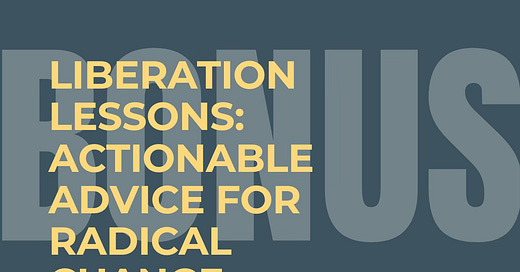How Do I Reclaim Liberation by Honoring the Legacy of Black Resistance? (Even when I am not Black)
Liberation Lessons: Actionable Advice for Radical Change A Weekly Paid Subscriber Bonus
Dear Liberators,
As we approach a time when the teaching of Black history is being restricted, erased, or co-opted, it’s important to remember this: Black history, as it’s often taught in schools or portrayed by dominant narratives, is not our history. It is the history of how whiteness has disrupted, violated, and attempted to erase Black liberation. When Black history is reduced to segregation, the Civil Rights Movement, and the “need” for civil rights, it centers the violence of white supremacy rather than the brilliance, creativity, and legacy of Black resistance. This is not accidental. It is a continuation of the erasure that colonization and white supremacy thrive upon.
But here’s the truth: No one can erase our history, because it lives within us. It’s in our stories, our families, our art, our movements, and our land. It’s in the way we gather, the songs we sing, the languages we reclaim, and the mutual aid we organize. To honor Black history is to reclaim it as more than trauma. It’s the story of survival, brilliance, rebellion, and continuous innovation.
So, as the system of whiteness attempts to erase or sanitize our history, we don’t panic—we disrupt. We reclaim. We remember that Black liberation movements have always thrived despite the system’s attempts to limit us. This week, we will honor the true legacy of Black resistance by learning how to apply its lessons to dismantle modern systems of oppression and create new pathways of liberation.
The Legacy of Supremacy Culture: What It Teaches vs. What We Reclaim
Supremacy culture wants us to believe that Black history is the story of struggle, but Black liberation movements teach us that it’s the story of resistance and reclamation. Consider these reframed lessons:
Supremacy Culture Says: Segregation, slavery, and civil rights define Black history.
Black Liberation Teaches: Black history is defined by innovation, resilience, and creation. From building entire towns like Greenwood (Black Wall Street) to leading global resistance movements, Black history is expansive, not limited to trauma. The destruction of Greenwood is white history.




